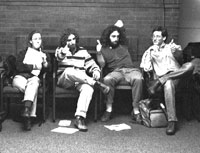

It has been over a year since student senators Joel Whitaker, OC '97, and former student Mark Graham stopped for a cup of coffee in The Java Zone and ended up drafting the new Student Senate Constitution on three paper napkins. And for current senators, the past year has been full of growing pains.
The newly-restructured Senate is slowly working to gain legitimacy on a campus full of students reluctant to trust a student government which traditionally has been viewed as disorganized and often ineffective.
This year, despite widespread student skepticism, senators have made a concerted effort to become a representative voice of the student body.

A jumble of voices
Some say such a representative voice has yet to emerge from any past system of Oberlin student governance.
"I don't think Oberlin students like to feel like they're representing others; people have too much baggage," Graham, who now works as editorial intern for the Office of College Relations, said.
Rather than working as one body to represent the students, many senators of the past were concerned with promoting their individual agendas, according to Whitaker.
"In 1991, Senate was a hotbed of activism. The hard-core activists flooded Senate. People felt you really needed to push the administration and the General Faculty to make your agenda known," Whitaker said.
It was student activists who banded together in the fall of 1990 to create a new student government.
Third World House residents and the now-defunct Democratic Socialists of America drafted a constitution instating a Student Senate to replace the College's Executive Council of Students, which faded from the campus in the mid-1980s due to a lack of student body interest.
The same activists who were so influential in creating a student government, however, often failed to live up to their potential once they became senators.
Former senator Noah Bopp, OC '96, said that from Senate's inception in the spring of 1991 until its restructuring last year, Senate meetings often consisted of the clamor of 30 individual voices speaking over one another.
"Senate operates according to what's called a 'feminist process,' where everybody gets the chance to speak," said Bopp, a senator for two and a half years. "We were very slow, but everybody sure as hell got the chance to speak-and speak we did."
Despite the fact that everybody voiced opinions, Bopp added, little was ever actually said at the meetings.
This may have been partly due to Senate's structure. Until this year, 20 senators were elected at large by the student body and 10 were appointed by specific student organizations through an organizational forum.
"The format with 30 people was horrendously inefficient," Whitaker said. "Those meetings were nightmares. We literally had five-hour meetings that would last until 1 in the morning. There was no decision-making process and we were out of control in the beginning."
Whitaker added that attendance at the meetings was often poor. "As a senator it was very frustrating to try and accomplish anything when just going to the meetings was tiring and inefficient. Sometimes only 12 people of 30 showed up," he said.
Frustrations grew so intense that nearly half the Senate resigned during the course of each school year, Whitaker said.

"One section, one dorm, one year"
Although it was becoming increasingly disorganized, Senate was still attempting to tackle controversial campus issues. In the spring of '96, those issues surfaced publicly in a Senate-organized speak-out on Wilder Bowl.
In 1993 Senate had received overwhelming support on a referendum asking students whether they would be in favor of having an option to live in co-ed rooms.
Whitaker drafted a proposal in 1994 which suggested that the College allow male and female students the chance to live together in co-ed divided-double dorm rooms.
The proposal specified that only certain sections of certain dorms would be allotted for co-ed rooms and that initially students would live in them on a trial basis only.
In addition, the rooms would be distributed only to students who applied for them. No first-year student would have the option of living in a co-ed room.
"The idea was not to 'live in sin' with your boyfriend or girlfriend, but that you should be able to live with your best friend no matter whom your best friend is," Bopp said. "Many people at Oberlin live in co-ed rooms unofficially; we wanted to make the policy official and be somewhat progressive in the process."
After passing the Senate overwhelmingly, the proposal went before the Housing and Dining Committee, where it lay dormant for awhile and eventually passed. It was then submitted to the Student Life Committee (SLC), and to senators' surprise and delight, was passed.
An emergency appeal from President of the College Nancy Dye and then-Dean of Students Charlene Cole-Newkirk halted the SLC from sending the proposal on to the General Faculty (GF), which wielded the power to ultimately incorporate the proposal into College bylaws.
Cole-Newkirk asked SLC members to give her three weeks to create an alternate co-ed rooms proposal which might be more agreeable to alumni, trustees, staff, faculty and administrators.
Three weeks later, she returned to SLC with what senators felt to be a vaguely worded proposal. Cole-Newkirk's basic idea was to renovate Noah Hall into co-ed suites consisting of a common room and several single rooms. The proposal did not specify a time to begin renovations, nor did it satisfy angry student senators.
"People were upset because they felt that President Dye and Dean Cole weren't being honest about their intentions," Bopp said.
Senators organized a well-publicized speak-out in May to protest the administration's intervention in the passage of the co-ed rooms proposal.
"We invited TV cameras and newspapers," senator senior Joshua Kaye, who has served on Senate since his sophomore year, said. "It really became a media circus."
Senators came up with a catchphrase to help their cause. "One section, one dorm, one year" was used to in chalkings, fliers and press releases in order to publicize the speak-out, which some estimated was attended by a modest crowd of 140 students.
Although the speak-out attracted the attention of Fortune magazine and the New York Times, as well as local television stations, the issue was never resolved.
Students attending the speak-out had the chance to sign Senate-drafted documents allowing them to switch official rooms in the fall of '96, and thus continue the Oberlin policy of living in co-ed rooms unofficially.
"We had asked Nancy Dye at our emergency Senate meeting the night before the speak-out if anybody had ever been punished for living in a co-ed room at Oberlin," Bopp said. "She said no. She said students would not be punished for living in co-ed rooms. At the speak-out, we told students, 'they've said they won't punish us, so let's go ahead and do it."
Only a few people signed the papers, however, and the issue had faded from the limelight by the time students returned to campus for Fall semester.
Many senators said they look back with regret on the way Senate handled the issue of co-ed rooms.
"The whole co-ed rooms thing was really a blight on Senate history," Graham said.
"Nothing could have shut down the issue more effectively than the speak-out and the media attention," Kaye said. "I learned the hard way that protesting doesn't change anything; the only thing it does is help set an agenda. Protesting is the last thing you want to do, because it alienates people and turns them into adversaries."
Bopp maintained that Senate won a moral victory, however. "We got the administration to acknowledge that co-ed rooms do exist on campus unofficially and that no one would be punished for living in them. That was something important," he said.

"The Senate Constitution and new hope"
At the time the co-ed rooms issue came to the forefront of campus politics, Senate was already beginning to experience internal disintegration.
By the spring of 1997, it became apparent to senators that Senate was no longer functioning in the way that it was meant to.
"I had this sense that Senate was about to become a victim of its own inertia and stop functioning," Whitaker said.
"There came a time when it was clear that Senate was becoming a joke," Kaye said.
At some point in the midst of its decline, Senate had managed to implement several worthwhile projects, such as the Department of Safety and Security's blue light walks. These walks allowed senators and all interested students to walk around the campus and map the areas where blue lights needed to be installed for reasons of security.
Senators also organized a used book sale in Wilder so students could buy and purchase textbooks at relatively cheap prices.
Despite the positive program implementations, many senators were dissatisfied with Senate's effectiveness as a governing body.
"Some of us wanted to resign and build something new," Kaye said. "The idea was that however much Senate was not working, its absence would have a result that would be apparent-if not right away, then shortly. Then there would be sufficient interest and need to change it."
Several senators did end up resigning in order to work independently on drafting a revised Senate Constitution.
Although Whitaker did not run for Senate after the fall of '95, he remained active in the campus political scene and, according to Graham, was instrumental in revamping Senate last spring.
He and Graham met at the Java Zone one night to lament the fact that Senate, according to Whitaker, "was an irredeemable mess that could never be fixed."
Complaints soon led to a session of brainstorming ideas to improve Senate, and before Whitaker and Graham knew what had happened, a rough draft of a new Senate Constitution had been hastily scribbled on paper napkins.
Under the newly-proposed Constitution, the number of senators was reduced from 30 to 15. The position of organizational senator was eliminated, although Senate candidates now have the option of asking specific organizations to endorse them.
In addition, senators are allowed to appoint non-senators to sit on faculty committees. Senate is also in charge of creating advisory councils which any member of the student body can join to discuss specific issues about which they are concerned.
Perhaps the most radical change was the provision of senator compensation. This year, senators are paid for 10 hours of work per week.
"Not having any kind of stipend was preventing low-income students from running for Senate, because they didn't have the time to add another activity that's so time-consuming in addition to a paid job," Whitaker said.
After Whitaker and Graham brought their Constitution to an enthusiastic Senate in the spring of 1997, senators held a referendum mandating that at least 50 percent of the student body needed to vote in favor of the new Constitution for it to take effect.
Fifty-two percent of the student body voted in a week-long referendum held by Senate in the spring of 1997, a greater turnout than senators had expected. The 95 percent of voters in favor of restructuring Senate was testimony to a clear need for change within the College's student governance system.
"The referendum was a real reaffirmation that people felt there was the possibility that a student government could work on this campus," Whitaker said.
With the referendum passed, senators modeled their plan of action to officially instate the new Constitution after what Kaye termed a "Star Wars model."
"It was a sort of 'Senate Constitution and new hope' approach," Kaye said. "Bringing the Constitution before the GF for approval was like blowing up the Death Star. The day after the Constitution passed was our version of the Ewoks' celebration."

Becoming the voice of the students
Senators agree that they have come a long way this year thanks to the new Constitution.
"Senate now functions much more collectively and effectively as a group," senator senior Dan Persky, a member of Senate for four years, said.
"I think the change has been absolutely dramatic and has actually surpassed what we expected. The difference between meetings last year and this year is incredible," senator sophomore Sarah Stein Greenberg said.
Senators have worked on revising a number of College policies this year. They have lengthened the amount of time a student can host an overnight guest, revised an outdated Rules and Regulations clause on student morality and made the College's search and seizure policy more friendly to students, among other things.
"Senate more than anything is a watchdog to make sure the student viewpoint is represented in College policies," Whitaker said.
Stein Greenberg said weekly meeting attendance has greatly increased this year, as has retention of senators.
Senator Adriana Lopez-Young, a double-degree junior, was elected to Senate at the beginning of second semester this year. "I joined Senate because I have to work and I was interested in pursuing student activism for wages. I guess the best part has been learning the process that effects change and making it work by immersing myself in it," she said.
Associate Dean of Students Bill Stackman, who has attended each weekly Senate meeting since his arrival on campus in January of 1997, said he has seen a remarkable improvement in Senate's structure.
"I feel this year's group certainly has been more productive, and more effective in creating positive change on campus," Stackman said. "They have also been much more active with the administration and other student constituencies."
Senate may be working to increase its outreach to the student body, but many students still believe Senate isn't as student-friendly as it could be.
First-year Laurel Paget-Seekins, who brought several proposals before Senate earlier this semester, said she grew frustrated during the senators' discussion of her proposals.
"I had some frustrations with the process," Paget-Seekins said. "I think students don't understand how Senate works and what they have to do. There needs to be some way for Senate to educate students about how to word proposals so they don't come into the process having done it wrong."
Senior Matt Borus, who submitted a proposal to Senate asking that it support students in an effort to examine College investment practices, said the atmosphere in Senate meetings could be friendlier, as well.
Borus said that at one Senate meeting, he and several other student guests were seated at the outer edges of the circular cluster of tables senators sit at.
"The entire student body is supposedly welcome and encouraged to come to Senate meetings," Borus said. "I think something more should be done to make them feel welcome while they're there. It's not just a matter of niceties; it does set up a dynamic."
Despite students' reluctance to fully make use of Senate as a legitimate body of governance to go to, senators said they feel improvements are being made all the time.
"Senate has been whining and moaning about publicity for years and I think it's finally discovered that the best publicity is just doing a good job," senator senior Chapin Benninghoff, a member of Senate on and off over the last six years, said.
"Oberlin students have always held a healthy skepticism about authority and Senate always walks in that twilight zone between being student advocates and being part of the power structure," Whitaker said.
At an open forum between Class Trustees and students earlier this semester, trustees urged students to make use of Senate, as it is perhaps the most effective voice they have.
While Senate may not be ready yet to become a voice completely representative of the student body, senators are endeavoring to listen to the people they're supposed to represent.
Community Service Coordinator for the Center for Service and Learning Hilary Greer, OC '96, said she has seen an about-face in Senate since her term as Ohio Public Interest Research Group (OPIRG) organizational senator.
"It's striking that Senate is no longer a joke on this campus. It's really apparent that the students I work with see Senate as an avenue for change. In my time, Senate was an obstacle for change," Greer said.
Copyright © 1998, The Oberlin Review.
Volume 126, Number 23, May 1, 1998
Contact us with your comments and suggestions.